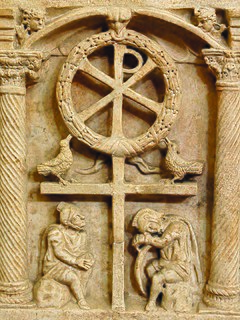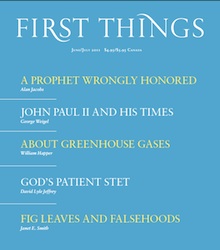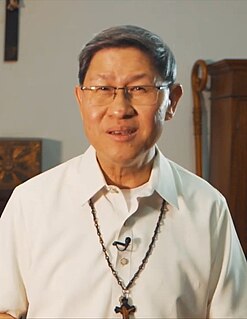Distributism is an economic theory asserting that the world's productive assets should be widely owned rather than concentrated. Developed in the late 19th and early 20th centuries, distributism was based upon the principles of Catholic social teaching, especially the teachings of Pope Leo XIII in his encyclical Rerum novarum (1891) and Pope Pius XI in Quadragesimo anno (1931).
Libertarian socialism, also referred to as anarcho-socialism, anarchist socialism, free socialism, stateless socialism, socialist anarchism and socialist libertarianism, is an anti-authoritarian, anti-statist and libertarian political philosophy within the socialist movement which rejects the state socialist conception of socialism as a statist form where the state retains centralized control of the economy. Overlapping with anarchism and libertarianism, libertarian socialists criticize wage slavery relationships within the workplace, emphasizing workers' self-management and decentralized structures of political organization. As a broad socialist tradition and movement, libertarian socialism includes anarchist, Marxist and anarchist or Marxist-inspired thought as well as other left-libertarian tendencies. Anarchism and libertarian Marxism are the main currents of libertarian socialism.

Left-wing politics supports social equality and egalitarianism, often in opposition to social hierarchy. Left-wing politics typically involves a concern for those in society whom its adherents perceive as disadvantaged relative to others as well as a belief that there are unjustified inequalities that need to be reduced or abolished. According to emeritus professor of economics Barry Clark, left-wing supporters "claim that human development flourishes when individuals engage in cooperative, mutually respectful relations that can thrive only when excessive differences in status, power, and wealth are eliminated."

In politics, integralism or integrism is the principle that the Catholic faith should be the basis of public law and public policy within civil society, wherever the preponderance of Catholics within that society makes this possible. Integralists uphold the 1864 definition of Pope Pius IX in Quanta cura that the religious neutrality of the civil power cannot be embraced as an ideal and the doctrine of Leo XIII in Immortale Dei on the religious obligations of states. In December 1965, the Second Vatican Council approved and Pope Paul VI promulgated the document Dignitatis humanae–the Council's "Declaration on Religious Freedom"–which states that it "leaves untouched traditional Catholic doctrine on the moral duty of men and societies toward the true religion and toward the one Church of Christ" while simultaneously declaring "that the human person has a right to religious freedom," a move that some traditionalists such as Society of St. Pius X-founder Archbishop Marcel Lefebvre have argued is in contradiction to previous doctrinal pronouncements. Integralists therefore do not accept the Second Vatican Council's perceived repudiation of civilly established Catholicism.

The Workers' Party is a political party in Brazil. Some scholars classify its ideology in the 21st century as social democracy, with the party shifting from a broadly socialist ideology in the 1990s. Founded in 1980, it is the largest left-wing party in Latin America. PT governed at the federal level in a coalition government with several other parties from 1 January 2003 to 31 August 2016. After the 2002 parliamentary election, PT became the largest party in the Chamber of Deputies and the largest in the Federal Senate for the first time With the highest approval rating in the history of the country, former President Luiz Inácio Lula da Silva is PT's most prominent member. His successor Dilma Rousseff, also a member of PT, took office on 1 January 2011 and was impeached in 2016.
The Christian left is a range of center-left and left-wing Christian political and social movements that largely embrace social justice viewpoints and uphold a social gospel.
Christian socialism is a religious and political philosophy that blends Christianity and socialism, endorsing left-wing politics and socialist economics on the basis of the Bible and the teachings of Jesus of Nazareth. Many Christian socialists believe capitalism to be idolatrous and rooted in the sin of greed. Christian socialists identify the cause of social inequality to be the greed that they associate with capitalism. Christian socialism became a major movement in the United Kingdom beginning in the 19th century. The Christian Socialist Movement, known as Christians on the Left since 2013, is one formal group.

The Communist Party of Bohemia and Moravia is a communist party in the Czech Republic. It has a membership of 42,994 (2016) and is a member party of the European United Left–Nordic Green Left bloc in the European Parliament.
Christian communism is a form of religious communism based on Christianity. It is a theological and political theory based upon the view that the teachings of Jesus Christ compel Christians to support communism as the ideal social system. Although there is no universal agreement on the exact date when Christian communism was founded, many Christian communists assert that evidence from the Bible suggests that the first Christians, including the apostles, established their own small communist society in the years following Jesus' death and resurrection. As such, many advocates of Christian communism argue that it was taught by Jesus and practiced by the apostles themselves. Some independent historians confirm it.

KDU-ČSL, often shortened to lidovci is a Christian-democratic political party in the Czech Republic. The party has taken part in almost every Czech Government since 1990 and have participated in both left-wing and right-wing coalition governments. In the June 2006 election, the party won 7.2% of the vote and 13 out of 200 seats; but in the 2010 election, this dropped to 4.4% and they lost all their seats. The party regained its parliamentary standing in the 2013 legislative election, winning 14 seats in the new parliament, thereby becoming the first party ever to return to the Chamber of Deputies after dropping out.

First Things (FT) is an ecumenical and conservative religious journal aimed at "advanc[ing] a religiously informed public philosophy for the ordering of society". The magazine, which focuses on theology, liturgy, church history, religious history, culture, education, society and politics, is inter-denominational and inter-religious, representing a broad intellectual tradition of Christian and Jewish critique of contemporary society. Published by the New York–based Institute on Religion and Public Life (IRPL), First Things is published monthly, except for bi-monthly issues covering June/July and August/September.
Historically, the Catholic Church opposed democracy, freedom of speech, and the separation of church and state under the grounds that "error has no rights". It eventually accommodated these ideas and began to view religious liberty as a positive value with Vatican II.
Religious socialism is a type of socialism based on religious values. Members of several major religions have found that their beliefs about human society fit with socialist principles and ideas. As a result, religious socialist movements have developed within these religions. Those movements include Buddhist socialism, Christian socialism, Islamic socialism and Jewish socialism. According to the Encyclopedia Britannica Online, socialism is a "social and economic doctrine that calls for public rather than private ownership or control of property and natural resources. According to the socialist view, individuals do not live or work in isolation but live in cooperation with one another. Furthermore, everything that people produce is in some sense a social product, and everyone who contributes to the production of a good is entitled to a share in it. Society as a whole, therefore, should own or at least control property for the benefit of all its members. [...] Early Christian communities also practiced the sharing of goods and labour, a simple form of socialism subsequently followed in certain forms of monasticism. Several monastic orders continue these practices today".

Yuval Levin is an American political analyst, academic, and journalist. He is the founding editor of National Affairs (2009–present), director of Social, Cultural, and Constitutional Studies at the American Enterprise Institute (2019–present), a contributing editor of National Review (2007–present) and co-founder and a senior editor of The New Atlantis (2003–present).

The Catholic Herald is a London-based Roman Catholic monthly newspaper and starting December 2014 a magazine, published in the United Kingdom, the Republic of Ireland and, formerly, the United States. It reports a total circulation of about 21,000 copies distributed to Roman Catholic parishes, wholesale outlets, and postal subscribers.

Luis Antonio Gokim Tagle is a Filipino cardinal of the Catholic Church who has been the Prefect of the Congregation for the Evangelization of Peoples since December 2019. He was the 32nd Archbishop of Manila from 2011 to 2019. Tagle also serves as the president of Caritas International, a federation of Catholic relief, development, and social service organizations, and of the Catholic Biblical Federation.
Religious communism is a form of communism that incorporates religious principles. Scholars have used the term to describe a variety of social or religious movements throughout history that have favored the common ownership of property.

Edward Michael Harrington Jr. was an American democratic socialist, writer, author of The Other America, political activist, political theorist, professor of political science, radio commentator and founding member of the Democratic Socialists of America.

RISE – Scotland's Left Alliance was a left-wing electoral alliance and political party created ahead of the 2016 Scottish Parliament general election. The name was a contrived acronym standing for Respect, Independence, Socialism and Environmentalism. The Party name was registered as 'RISE - Respect, Independence, Socialism and Environmentalism'. The party was deregistered in November 2020.










